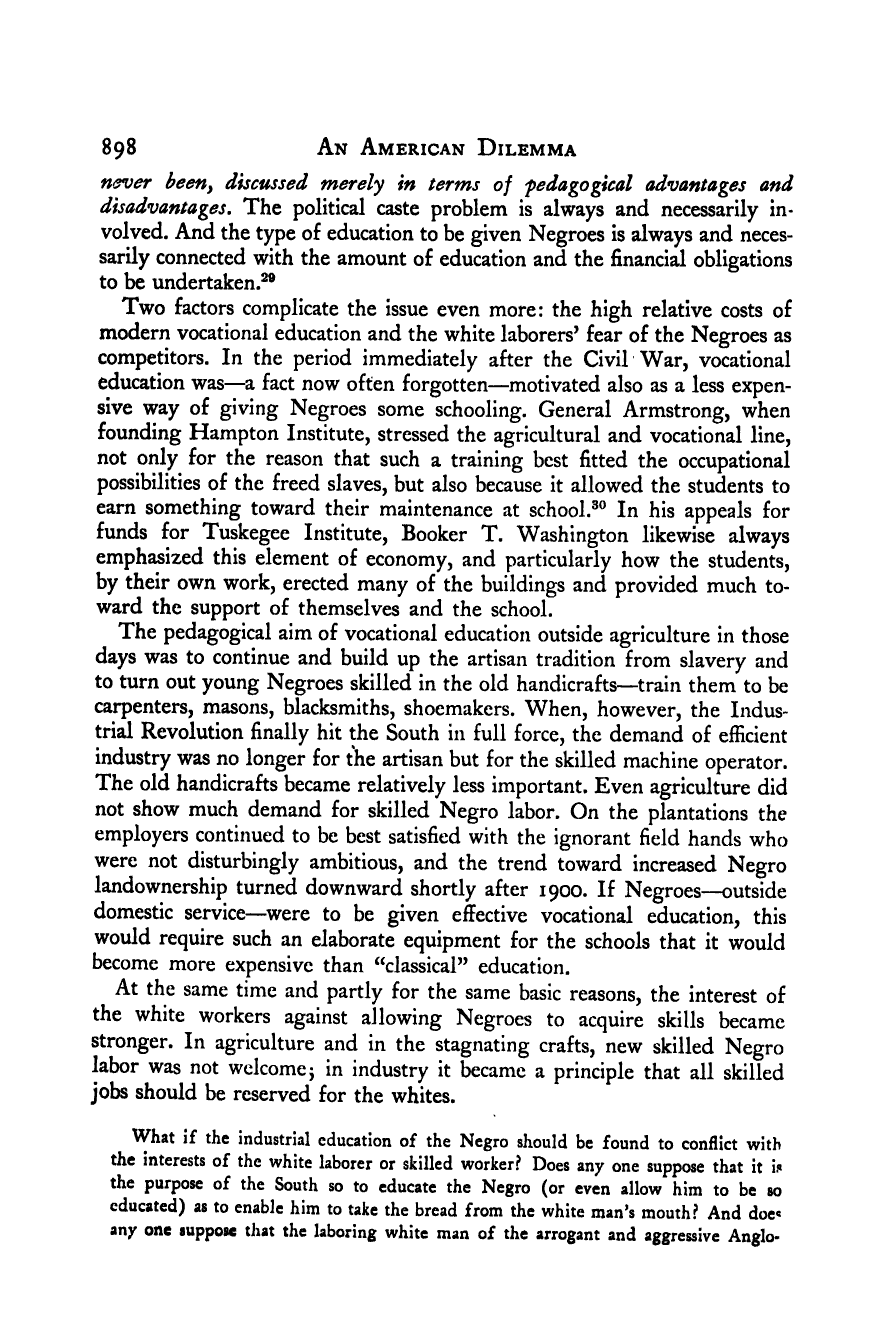Note: Gunnar Myrdal died in 1987, less than 70 years ago. Therefore, this work is protected by copyright, restricting your legal rights to reproduce it. However, you are welcome to view it on screen, as you do now. Read more about copyright.
Full resolution (TIFF) - On this page / på denna sida - IX. Leadership and Concerted Action - 41. The Negro School - 5. “Industrial” versus “Classical” Education of Negroes

<< prev. page << föreg. sida << >> nästa sida >> next page >>
Below is the raw OCR text
from the above scanned image.
Do you see an error? Proofread the page now!
Här nedan syns maskintolkade texten från faksimilbilden ovan.
Ser du något fel? Korrekturläs sidan nu!
This page has never been proofread. / Denna sida har aldrig korrekturlästs.
898 An American Dilemma
never been^ discussed merely in terms of pedagogical advantages and
disadvantages. The political caste problem is always and necessarily in-
volved. And the type of education to be given Negroes is always and neces-
sarily connected with the amount of education and the financial obligations
to be undertaken.^®
Two factors complicate the issue even more: the high relative costs of
modern vocational education and the white laborers’ fear of the Negroes as
competitors. In the period immediately after the Civil War, vocational
education was—a fact now often forgotten—motivated also as a less expen-
sive way of giving Negroes some schooling. General Armstrong, when
founding Hampton Institute, stressed the agricultural and vocational line,
not only for the reason that such a training best fitted the occupational
possibilities of the freed slaves, but also because it allowed the students to
earn something toward their maintenance at school.®® In his appeals for
funds for Tuskegee Institute, Booker T. Washington likewise always
emphasized this element of economy, and particularly how the students,
by their own work, erected many of the buildings and provided much to-
ward the support of themselves and the school.
The pedagogical aim of vocational education outside agriculture in those
days was to continue and build up the artisan tradition from slavery and
to turn out young Negroes skilled in the old handicrafts—train them to be
carpenters, masons, blacksmiths, shoemakers. When, however, the Indus-
trie Revolution finally hit the South in full force, the demand of efficient
industry was no longer for the artisan but for the skilled machine operator.
The old handicrafts became relatively less important. Even agriculture did
not show much demand for skilled Negro labor. On the plantations the
employers continued to be best satisfied with the ignorant field hands who
were not disturbingly ambitious, and the trend toward increased Negro
landownership turned downward shortly after 1900. If Negroes—outside
domestic service—were to be given effective vocational education, this
would require such an elaborate equipment for the schools that it would
become more expensive than ‘^classical” education.
At the same time and partly for the same basic reasons, the interest of
the white workers against allowing Negroes to acquire skills became
stronger. In agriculture and in the stagnating crafts, new skilled Negro
labor was not welcome j
in industry it became a principle that all skilled
jobs should be reserved for the whites.
What if the industrial education of the Negro should be found to conflict with
the interests of the white laborer or skilled worker? Does any one suppose that it is
the purpose of the South so to educate the Negro (or even allow him to be so
educated) as to enable him to take the bread from the white man’s mouth? And doe«
any one suppose that the laboring white man of the arrogant and aggressive Anglo*
<< prev. page << föreg. sida << >> nästa sida >> next page >>